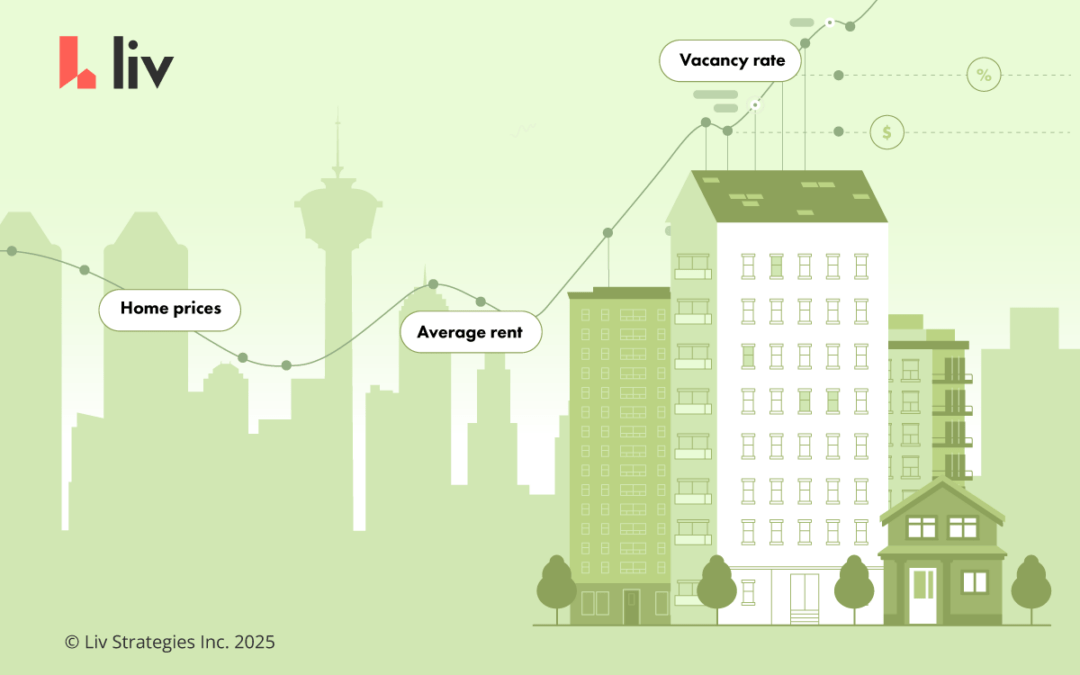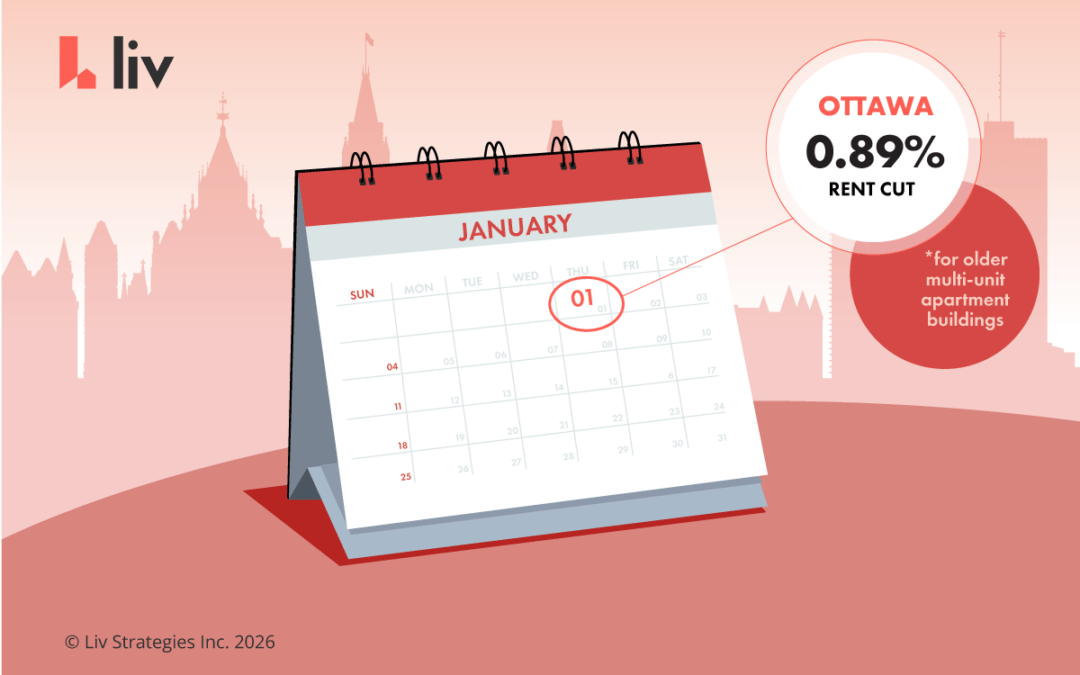Rent increases have become a hot topic in Alberta as the province’s rent prices rise. If your lease is up for renewal, you may be wondering: does Alberta have a rent increase limit? The rules surrounding rent increases in the province can be confusing for new renters and landlords, so this post from liv.rent will break down the guidelines and key points surrounding rent increases in Alberta.
Try Premium Landlord Features for free!
Alberta landlords, elevate your rental game with a FREE one-month trial of liv.rent’s Growth plan! Access $68 worth of premium features like Multi-Platform Advertising and Trust Score tenant screening reports with Equifax® credit information.
Does Alberta have a rent increase limit?
Unlike some other provinces like B.C. and Ontario, Alberta rental laws do not place a hard limit on rent increases. With that said, landlords may only increase rent if one full year has passed since the tenant moved in, and cannot increase rent during a fixed-term tenancy. For example, if a tenant signs a six-month lease agreement and then a one-year lease agreement, the landlord must wait until the one-year lease agreement has ended before raising rent.
How rent increases are calculated in Alberta
Since there is no legislated cap on rent increases in Alberta, landlords are technically free to increase rent by however much they want. Still, the increase must be considered reasonable, and tenants can dispute an increase if they believe it is excessive. In Alberta, the Residential Tenancy Dispute Resolution Service (RTDRS) is a dedicated government service that helps landlords and tenants resolve disputes such as those related to rent increases.
To calculate an appropriate rent increase, landlords are advised to look at current asking rent prices for their area. Keep in mind the size of the property, number of bedrooms & bathrooms, location, and included features and amenities when determining how much to charge for rent.
>> Recommended Reading: The latest Calgary & Edmonton Rent Report
What is Alberta’s rent increase limit for 2025?
As with previous years, Alberta has not implemented a rent increase cap for 2025. Landlords are able to increase rent within reason, so long as they follow the guidelines listed here for fixed-term and periodic tenancies.
How landlords can increase rent in Alberta
Rules for how to conduct a rent increase in Alberta vary based on whether the tenant is renting on a fixed-term or periodic basis. As the name suggests, a fixed-term lease has a concrete end date whereas a periodic tenancy (i.e. month-to-month or week-to-week) renews automatically after each stated period.
Below, you can find detailed rules for increasing rent for fixed-term or periodic tenancies.
Fixed-term tenancies
In a fixed-term tenancy, the terms of the lease agreement are set for a specific duration. The landlord cannot unilaterally increase the rent during this period unless there is a specific clause in the lease allowing for such increases.
When the fixed-term lease is approaching its end, the landlord may choose to negotiate a new lease with the tenant. If a rent increase is desired, it should be clearly communicated and agreed upon in the new lease agreement. The tenant has the option to accept or decline the proposed terms.
While it’s not necessary to provide current tenants with notice if a landlord plans to increase their rent under a new lease, it’s always advisable to be open about a potential increase if you want to renew a lease.
Periodic tenancies
For periodic tenancies, landlords must provide tenants with written notice in advance of the proposed rent increase. The notice must clearly state the date of the increase and be signed and dated by the landlord or property manager.
For month-to-month tenancies, landlords are required to provide tenants with notice of a rent increase at least three months before the intended effective date. If, for instance, the landlord plans to implement a rent hike starting on November 1, they must serve notice by July 31.
In the case of weekly tenancies, landlords must give tenants a minimum of twelve weeks’ notice before applying a rent increase. For example, if the desired effective date for the rent increase is Monday, November 1, the landlord should serve notice no later than Monday, August 9.
Let us advertise your listing
Unlock Multi-Platform Advertising and let the liv.rent team advertise your listing for you. Upgrade to a Growth or Business plan or buy credits and we’ll share your listing to Craigslist, Zumper and Facebook Marketplace, plus manage all inquiries.
Calgary and Edmonton
Residents of both Calgary and Edmonton, the two largest cities in Alberta are not exempt from rental increases. Neither city has set guidelines around rent control limits. Therefore, they must follow the province’s rules on rent control which can be found in the RTA Handbook.
These measures could be partly to blame as Calgary has seen the highest yearly rent increase amongst Canadian cities. The CMHC reports purpose-built homes in Calgary saw a rent increase of 14.3% in 2023 compared to 2022, the largest increase since 2007.
What happens if a tenant refuses a rent increase
If a tenant disagrees with a proposed rent increase in Alberta, they can dispute it through the Residential Tenancy Dispute Resolution Service (RTDRS), an independent government service. The RTDRS will then review the case and make a decision based on applicable laws and determine whether the increase is within reasonable limits.
If a tenant decides they don’t want to pay an increased rate upon renewing a fixed-term lease agreement, they can simply end the tenancy. If, however, a tenant refuses a lawful rent increase during a periodic tenancy, the landlord may end the tenancy by giving the proper notice.
Alberta rent increase resources
Alberta renters and landlords can learn more about rent increase guidelines with the following resources.
- Monthly Calgary & Edmonton Rent Report – liv.rent
- Understanding the Alberta Residential Tenancy Agreement – liv.rent
- Rent Increase Handbook – Service Alberta

Rethink The Way You Rent
Not on liv.rent yet? Experience the ease of digital applications & contracts, verified tenants & landlords, virtual tours and more – all on one platform. Sign up for free or download the app.
Subscribe to receive the latest tenant & landlord tips and get notified about changes in the Canadian rental market.
>> Stay up-to-date on the average rent in Vancouver, Toronto and Montreal: Rent Reports.




0 Comments